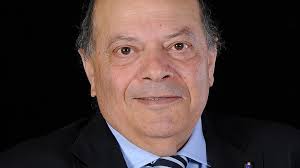By Andrew Warshaw
March 17 – Following Insideworldfootball’s exclusive revelation that UEFA vice-president Marios Lefkaritis was exploiting a loophole in age restrictions in an attempt to cement his power base, the veteran Cypriot has agreed to withdraw from international football politics, bringing the curtain down on his 21-year career.
UEFA have announced that the 70-year-old has pulled out of trying to retain his seat on the European governing body’s executive committee, leaving 12 candidates for eight seats at the election Congress in Helsinki on April 5.
UEFA said Lefkaritis “informed all 55 national associations of his decision in a letter sent on Thursday”.
Lefkaritis, UEFA’s finance chief who had been at its top table for a generation, becomes the latest member of world football’s old guard to leave the scene following Issa Hayatou’s stunning Confederation of African Football presidential election defeat on Thursday. He also relinquishes his membership of FIFA’s ruling Council having previously been on the FIFA exco before it was revamped.
UEFA gave no reason for Lefkaritis’ move but it is highly likely that UEFA president Aleksander Ceferin had some influence behind the scenes.
Last month, this website reported that Lefkaritis, one of the longest-serving figures among European football’s old guard elite, was playing a risky game by calling into question Ceferin’s progressive governance programme.
Although UEFA statutes say “a person aged 70 or more shall not be eligible for election or re-election”, we discovered an anomaly in the regulations, one which theoretically could have allowed Lefkaritis to stay on the exco until the age of 82 – even older than the much-maligned Sepp Blatter in the final days of his FIFA presidency.
Although the 70 age limit covers most of UEFA’s internal bodies, members of the exco, the organisation’s inner sanctum and chief decision-making body, are exempt under a further statute which states that the ceiling “does not apply to President of UEFA, the 13 members of the Executive Committee and the Committee members in office on 11th October 2001.”
Given Ceferin’s robust governance plans, eyebrows were raised at UEFA’s 70 age restriction not applying to exco members. It was also pointed out that Lefkaritis, who is now honorary president of the Cyprus FA after a decade of running his federation, did not meet the new eligibility criteria which clarify that exco members must hold one of four specific positions in their national association: president, vice-president, general secretary or CEO.
It would appear that all this was too much for the Cypriot to hang on and he has now decided to call it a day after a long and controversial career. Although he has not been found guilty of any wrongdoing, he was among those who voted in the election that handed World Cup hosting rights to Russia and Qatar, respectively, and is widely reported to have been one of the individuals the Swiss attorney general’s office was keen to question as part of their ongoing probe.
In another episode, a whistleblower from Lefkaritis’ homeland alleged several years ago that the Euro 2012 bidding contest (ultimately won by Poland and Ukraine) had been rigged. UEFA launched a defamation action in Switzerland against the whistleblower, who withdrew his claims several weeks later.
There was no evidence to link Lefkaritis with the incident but at one point, on his official FIFA biography page, Lefkaritis listed “recent allegations for corruption” as his response to being asked what was his biggest disappointment in football.
Contact the writer of this story at moc.l1751589333labto1751589333ofdlr1751589333owedi1751589333sni@w1751589333ahsra1751589333w.wer1751589333dna1751589333

